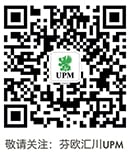On the verge of something big – those are the words Pesonen uses to describe the company he runs.
Firstly, that something big is Finland’s Olkiluoto nuclear power plant unit (OL3) which will increase UPM’s electricity production by almost 50 % in one go at a time of exceptionally high market prices.
Pulp production capacity will increase even more, by around 55 %, when the Paso de los Toros pulp mill in Uruguay begins operations in early 2023. As he prepared to inaugurate the pulp terminal at the Port of Montevideo, Pesonen made no secret of his excitement: “Paso de los Toros is an extremely well-managed project in very challenging circumstances, where the pandemic disrupted the logistics and was a big challenge on the factory site itself. Kudos to the project team.”

UPM Paso de los Toros
The opening of a biochemicals refinery in Leuna, Germany is not far away either. In that instance, UPM will not only have more capacity, but a completely new business – unique even on a global scale.
But what does the CEO think about the fact that the mainstream news is all about war, the energy crisis, recession, inflation, and interest rates?
And how does Biofore strategy work in a world that was turned upside down in an instant?
Is regionalisation underway?
Biofore strategy responds to climate change: the company manufactures products from forest biomass to reduce the use of fossil materials and energy. Now war, the energy crisis and geopolitical upheaval have overtaken climate change, at least for the moment.
According to Pesonen, changes in the economy, energy, food chains and logistics may be long-lasting and will certainly test both society and households.
“From UPM’s perspective, however, the underlying situation or market outlook has not changed. The balance sheet is strong, and we can continue to implement our strategy and growth projects,” says Pesonen.
Pesonen has three points to highlight. Firstly, the strong balance sheet; second, the right business model, with a focus on implementing strategic projects and ensuring the health of business performance; and third, as global as UPM is, raw material sourcing, production and customer service are local.
Localism is important since globalisation can turn into regionalisation, which can lead to barriers to trade and the flow of goods.
“But even in this context, we have the opportunity to be effective.
UPM is well positioned and ready to not only meet challenges but to also seize opportunities,” says Pesonen.
One interesting question is what changes the new geopolitical setting will bring about in China and Asia, which are important for UPM. Pesonen thinks that the coming year will show how China will overcome the coronavirus and whether the country may have a new direction.
“The fact has not changed that Asia is a big, growing market where middle-class growth and urbanisation are continuing apace. This basic setting is unchanged.”
Leuna chemistry is everywhere
On UPM’s global map, Germany is of major importance. Pesonen is often asked how the paper industry will fare there, with gas shortages expected to cripple industry and the economy this winter.
He is concerned but points out that printing papers no longer account for a very large part of the company’s turnover, let alone profit, and that the German mills are not of a single type.
“Some mills have a biopower plant and co-generation of heat and electricity for the community. Then there are those who use only natural gas, and there will certainly be challenges.”
With some dark clouds hanging over Germany, UPM sees the sun breaking through an opening the size of the Leuna biochemicals refinery.

UPM Leuna
“We are truly the first to make chemical products from forest biomass. The situation is also favourable since the raw material that is exploited locally has nothing to do with Russia,” Pesonen points out.
Commercial interest in the biochemicals refinery, which is due to be completed by the end of 2023, is already enormous, although the emission reduction potential of the refinery’s products is not yet fully understood, according to Pesonen.
“Leuna chemistry is not just PET bottles or carbon black. Those molecules are everywhere, in every single object in this conference room. We will find for the most appropriate end-use segments with the highest market penetration and the right price.”
Proud of paper
Pesonen says he is very satisfied with the company’s business portfolio, which combines growing businesses, bio-based new businesses, and mature paper business.
The portfolio has proved its worth, but its existence is not a given.
“When I started in 2004, the mindset was to be global, focus on one, sell others and put the balance sheet to efficient use. Everything from labels, energy, pulp and plywood was called into question. I don’t know why I thought differently at the time, but that’s just the way I thought,” Pesonen recalls.
He also remembers thinking that there are two criteria for a business to be suitable for UPM: the raw material is forest biomass, but the business must also earn its position as one of the best in its sector.
“At Raflatac, we have proven that we can grow and be competitive. Growth has been close to 5% per year, and margins have doubled. The same applies to Pulp for example, where we quickly became one of the world leaders.”
The transformation from a paper company to today’s UPM has taken 20 years and has not only required adaptation to the declining demand for printing papers, but also the ability to innovate ground-breaking products such as biochemical and biomedical products.
One thing Pesonen never forgets to mention when talking about the transformation of the company is that UPM is the only company where paper still plays a strong role:
